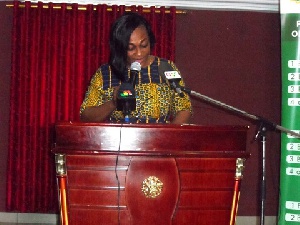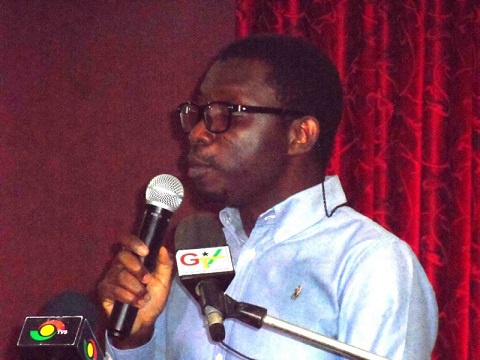 Madam Otiko Afisa Djaba addressing the opening session of a case management training workshop
Madam Otiko Afisa Djaba addressing the opening session of a case management training workshop
The Ministry of Gender, Children and Social Protection has directed the national secretariat of the Livelihood Empowerment Against Poverty (LEAP) to include fistula, autism, cerebral palsy, cancer and hemophilia patients amongst their beneficiaries.
This is because of their special needs and circumstances which cannot be ignored, said Madam Otiko Afisa Djaba, the Sector Minister, on Monday.
LEAP, is a social cash transfer programme that provides cash grant to extremely poor households across the country.
Its main aim is to alleviate short-term poverty and encourage long-term human capital development.
Beneficiaries comprise orphans and vulnerable children, persons with severe disability without any productive capacity and elderly persons who are 65 years and above and without any form of support.
They also include pregnant women and children below two years in extremely poor households, orphanages, alleged witch camps, leprosaria and indigenes.
Beneficiaries receive various amounts of money ranging from GHC 64 and GHC 106 at specific intervals.
Addressing the opening session of a case management training workshop on the LEAP programme at Abesim in the Sunyani Municipality, Madam Djaba affirmed the government’s commitment to strengthen the programme to benefit more people.
She said 350,000 extremely poor and vulnerable households in the country are expected to benefit from the LEAP programme by early next year.
About 66 District Directors of the Department of Social Welfare drawn from selected Metropolitan, Municipal and District Assemblies in the country are attending the two-day training workshop being organized by the by the LEAP management secretariat.
The workshop is aimed at equipping and positioning the participants to be able to identify challenges impeding the implementation of the LEAP programme.
Madam Djaba said currently Ghana had a vibrant and internationally recognized cash transfer programme because the implementation of the LEAP has proven to be a relatively effective means of gradually and systematically eliminating poverty and bridging the inequality gaps in the country.
“This is manifested in the fact that other countries and researchers are trooping in to learn and research about the LEAP programme. LEAP is attracting local and international attention because evidence from number of impact assessments of the programme have highlighted the immense positive impact the LEAP programme is having on the lives of our beneficiaries”, the Sector Minister said.
Madam Djaba said since its inception in 2008 by the previous NPP government, the LEAP Programme has expanded from 1,645 beneficiary households in 21 districts in 2008 to 213,044 beneficiary households in 216 districts.
She expressed dismay about alleged extortion of monies from the beneficiaries and under-payment warning that officers who would be caught participating in such acts would be sanctioned.
Madam Djaba said the roles of the media, Regional Directors of the Department of Social Welfare, District Social Welfare Officers, Community LEAP Implementation Committees and civil society organizations are imperative for the successful implementation of the programme.
She urged the media to report any case of extortion or underpayment of beneficiaries to the ministry for the necessary action to be taken.
Madam Djaba expressed appreciation to development partners for their immersed and continuous support to the LEAP programme, saying government has plans to refocus the programme to ensure that it did not become a source of political patronage but a tool for supporting poor and vulnerable groups in the country.
Mr Dzigbordi Kofi Agbekpornu, the National Programme Manager of the LEAP programme, said the contributions of the Ministry of Gender, Children and Social Protection to the sustainability of the programme was highly appreciated and commendable.
He said a collective support was required from local communities to identify deserving beneficiaries’ who are not enjoying the programme to be included.
Mr Agbekpornu urged the participants to file and provide comprehensive reports on cases for proper management.
Mr Daniel Nonah, the Acting National Director of the Department of Social Welfare, expressed concern about the lack of a baseline data at the Department.
He called on the district offices of the Department to provide a realistic data base on all reported cases to serve as a guide in policy formulation.


